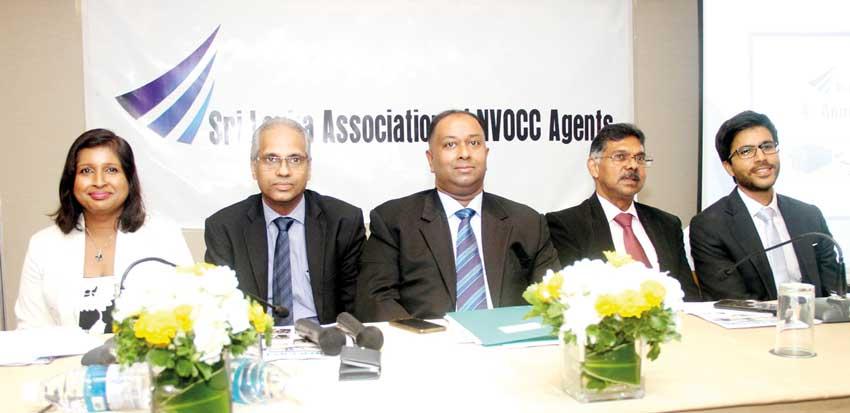14 Sep 2020 - {{hitsCtrl.values.hits}}

From left: SLANA Secretary Swaba Wickramasinghe, SLANA Vice Chairman Nalin Abaysekera, SLANA Chairman Harsha De Silva, Former SLTB, Director (Promotions) and current Consultant (Global Campaign) attached to SLTPB Hasitha de Alwis and SLANA Treasurer Aanada Senanayake
By Nishel Fernando
Identifying the crucial role of non-vessel operating common carriers (NVOCC) in regional trade, feeder-shipping operators are increasingly looking at owning their own NVOCC lines to jointly develop regional business.
“A developing trend, which we have noticed in recent times is the interest of feeder shipping operators in launching their own NVOCC lines or acquiring existing NVOCCs into their groups to jointly develop their regional business,” Sri Lanka Association of Non-Vessel Owning Container Carriers (NVOCC) Agents (SLANA) Chairman Harsha De Silva said. He was addressing the fourth Annual General Meeting of the SLANA in Colombo last Thursday, after being re-elected as Chairperson for a second term.
De Silva noted that NVOCCs would also benefit by this trend as it is expected to strengthen the regional NVOCC lines.
Further, He stressed that this particular development is also a recognition of NVOCCs, which play a major role in regional trade.
“The international feeder operators are realising that they also need a NVOCC arm to develop their trade. Therefore, it will become something similar to a regional line eventually,” he added.
NVOCCs are considered to be mini regional shipping lines, which own container fleets ranging from general purpose dry containers, refrigerated containers, liquid carrying ISO tank containers, project cargo carrying flat rack and open top type containers.
A significant number of NVOCC principals operate in the Indian Subcontinent region including Pakistan, Bangladesh, Nepal and
Maldives being an essential support service for SAARC countries’ trade.
Further, NVOCCs also operate from Sri Lanka to the Middle East – Gulf and South East Asian regions covering the Far East ports reaching all the way to China.
In the Sri Lankan context, some of the key exporters in the country solely rely on NVOCCs to ship their products securely to the end market, which is true in particular for the country’s tea industry accessing some of the major markets.
“Many of our dry and reefer principals cover inland destinations especially in India and SAARC region, which gives Sri Lankan exporters opportunities to reach these destinations with regular frequency at minimal cost, and currently we see NVOCCs providing very useful services to the Sri Lankan tea industry by operating to many key ports in the middle east, including war risk countries where main lines have currently stopped their services,” De Silva elaborated.
According to SLANA, there are currently 50 active NVOCC principals in Sri Lanka operating in and out of the country giving added value to the trade for the exporters and importers to enjoy competitive rates.
However, due to the current ban on terminal handling charges (THC) and other surcharges levied by container lines, which is a key part of the operating model of NVOCCs, the sustainability of the industry is questioned, with several NVOCC principals pulling out from the country since the ban came into effect in 2014.
“The NVOCC lines’ operating model includes shore-based cost recoveries (including THC recoveries), and this important aspect should be identified and acknowledged by the shipping authorities of Sri Lanka to ensure the continuous presence of NVOCC operators in the future,” De Silva pointed out.
In addition, NVOCC in particular has been impacted by the lower regional cargo movement stemming from COVID-19 pandemic as well as by import restrictions placed by the Sri Lankan government on non-essential and luxury items.
18 Nov 2024 16 minute ago
18 Nov 2024 4 hours ago
18 Nov 2024 5 hours ago
18 Nov 2024 5 hours ago
18 Nov 2024 5 hours ago